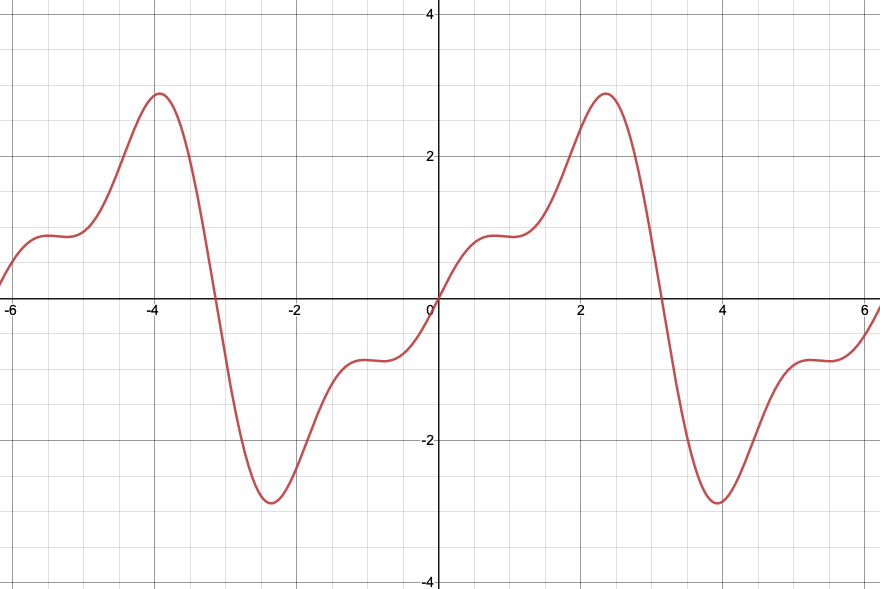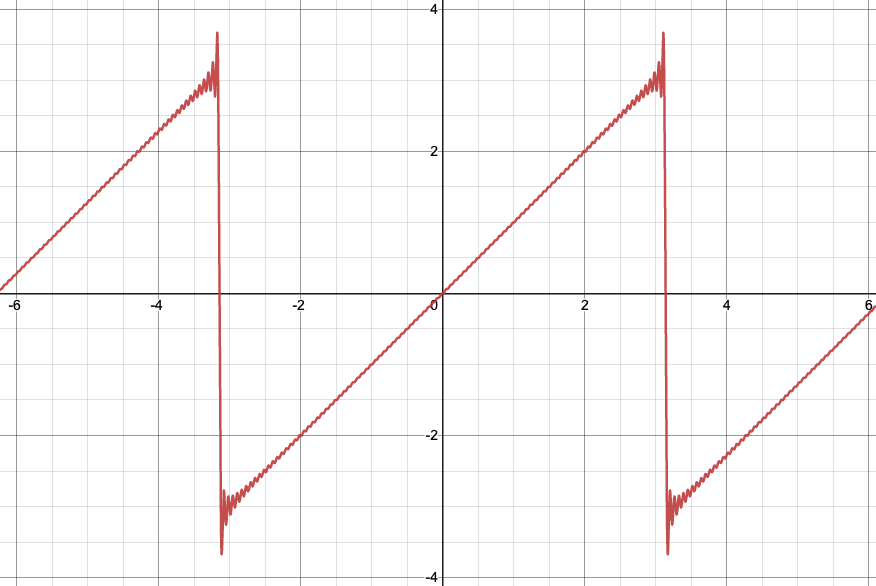Fourier Coefficients
- Determining Coefficients of Fourier Series
- Convergence of twice cts differentiable functions
- Riemann's Theorem
In the previous posts, I used \(\cdot\) to refer to the inner product. Given that this is quite confusing as \(\cdot\) is also used for multiplication, I'm now going to use \(\iprod{f,g}\) to refer to the inner product of \(f,g\).
Determining Coefficients of Fourier Series
Suppose I had a function \(f\) that can be written as a fourier series as in equation 1 (we still haven't figured out what conditions need to be imposed on \(f\) to ensure this, but we'll take care of that in due time). Then by equation 2, $$\iprod{f,1}=\iprod{c,1}=2\pi c$$$$c=\frac1{2\pi}\iprod{f,1}\tag{10}$$Similarly, by theorem 1, $$a_k=\frac1\pi\iprod{f,\sin kx}\tag{11}$$$$b_k=\frac1\pi\iprod{f,\cos kx}\tag{12}$$
Convergence of twice continuously differentiable functions
How do we evaluate the inner products of \(f\) with our trigonometric functions? If we assume that \(f\in C^2\) (the set of functions which have continuous second derivative), then we can use integration by parts to rewrite equations 11-12 as follows:$$b_k=\frac1\pi\iprod{f,\cos kx}=\left[\frac1{k\pi}f(x)\sin kx\right]\Bigg\vert_{-\pi}^\pi-\frac1{k\pi}\iprod{f^\prime,\sin kx}$$$$=\left[\frac1{k\pi}f(x)\sin kx\right]\Bigg\vert_{-\pi}^\pi+\left[\frac1{k^2\pi}f^\prime(x)\cos kx\right]\Bigg\vert_{-\pi}^\pi-\frac1{k^2\pi}\iprod{f^{\prime\prime},\cos kx}$$Note that the non-integral terms are zero, leaving us with $$b_k=\frac1{k^2\pi}\iprod{f^{\prime\prime},\cos kx}\tag{14}$$If \(\sup|f^{\prime\prime}|=M\), then we have $$b_k\leq\frac1{k^2\pi}\iprod{M,1}=\frac{2M}{k^2}$$A parallel argument shows that $$a_k\leq\frac{2M}{k^2}$$Thus, $$\sum\limits_{k=1}^\infty\left(|a_k\sin kx|+|b_k\cos kx|\right)\leq \sum\limits_{k=1}^\infty(|a_k|+|b_k|)\leq\frac{2M\pi^2}3$$with the last inequality due to Tonelli. By the Preliminaries, this implies that the fourier series converges everywhere.
Note: This does not mean that it necessarily converges to the function that determined the coefficients of the fourier series. We'll prove that in the next post for a special category of function.
Riemann's Theorem
One of the key issues with the fourier series so far is that we have no guarantee about how well partial sums approximate the total summation, and how well the total summation approximates \(f\). The latter question is a bit tricky and will be dealt with later.
However, we can show that the partial summations of the fourier series converge well to the total summation for arbitrary functions in \(L_2([-\pi,\pi))\). To see why, we have to invoke the fact that this space is a Hilbert space.
With Bessel's inequality, we can show the following.


